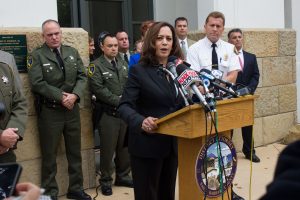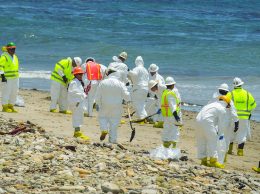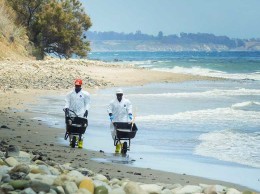Plains faces criminal charges over Refugio oil spill
IN THIS ARTICLE
- Energy Topic
- pacbiztimes Author
By pacbiztimes Tuesday, May 17th, 2016

California Attorney General Kamala Harris discusses the Plains All American Pipeline indictment outside of the Santa Barbara County District Attorney’s office on May 17. (Alex Kacik)
Story updated at 2:30 p.m. May 17:
A California grand jury has indicted Plains All American Pipeline on four felony counts in connection with the Refugio oil spill, prosecutors announced on May 17.
The Houston-based oil and gas infrastructure company is facing 46 criminal charges for the May 19, 2015 oil spill that soiled the Gaviota Coast and beyond. A mid-level Plains employee is also charged with three misdemeanors, according to Santa Barbara County District Attorney Joyce Dudley and California Attorney General Kamala Harris.
“This is the first step in holding Plains accountable,” Harris said at a news conference on May 17 outside of the Santa Barbara County District Attorney’s office. “We are committed to putting all of the resources that are necessary in seeing this case through.”
While Dudley did not elaborate on the felony charges currently in the sealed indictment, she said they include knowingly discharging a pollutant into state waters. Plains and its 41-year-old environmental and regulatory compliance specialist James Buchanan are also facing misdemeanor charges, including failure to notify proper authorities in a timely manner. Buchanan is not charged with any felonies; he faces a maximum jail sentence of three years.
In addition, there are numerous misdemeanor violations related to the impact on wildlife.
Prosecutors estimated that Plains would pay between $1 million and $2.8 million in fines plus additional penalties and costs. Cleanup costs have totaled $150 million thus far, said Plains, estimating that the environmental disaster would amount to about $269 million in its annual report. The company expects insurance to cover $186 million of those costs.
Dudley said that Plains had not been cooperative or transparent throughout the criminal investigation, which had a one-year statute of limitations.
“I agree with the district attorney, they have been far less than cooperative,” Harris said. “As we go forward we’ll see if their cooperation and performance improves but it has been quite disappointing so far.”
The criminal charges serve as not only punishment but also a deterrent, said Linda Krop of the Environmental Defense Center.
“To get a criminal indictment is huge,” she said after the news conference. “Four felony indictments is rare.”
In order to prove criminal wrongdoing, prosecutors must demonstrate that Plains knew or should have known of the safety risks, Harris said.
Plains denied the charges and any criminal activity.
“Neither the company nor any of its employees engaged in any criminal behavior at any time in connection with this accident and criminal charges are unwarranted,” the company said in a statement. “We will vigorously defend ourselves against these charges and are confident we will demonstrate that the charges have no merit and represent an inappropriate attempt to criminalize an unfortunate accident.”
The oil spill fouled the Gaviota Coast with an estimated 123,270 gallons of crude oil, according to Plains’ most recent projection in its annual report. About 21,000 gallons made their way from the underground Line 901 pipe through a storm culvert and into the Pacific Ocean.
The faulty Line 901 is the only pipeline in Santa Barbara County without an automatic shut-off valve. A preliminary report from the Pipeline Hazardous Materials Safety Administration found that Plains let the heavily corroded pipeline run for 35 minutes following the spill. The company did not notify federal authorities of the leak for more than three hours.
Results from Plains’ in-line inspection on May 6, just 13 days before the spill, revealed two critical parts of the pipeline that were up to 86 percent corroded. The PHMSA report said that Plains’ inspection did not accurately convey the amount of external corrosion in the area of the release.
The pipe closures have set off an economic ripple effect throughout the Tri-Counties. Some of the region’s biggest oil producers have been virtually shut in since Line 901 and Line 903 were shut down. The region has lost property tax revenue from diminished oil production and Venoco put some of the blame on Plains when it filed for Chapter 11 bankruptcy protection. There is no time table for Line 901 and Line 903’s restart at this time.
Plains has settled some of the claims to date, including a total of $1.9 million filed by Santa Barbara County. But there are a series of lawsuits issued by those who have not been made whole, including area homeowners who claim their property lost value, fishermen and oil workers who were out of jobs and the city of Long Beach that allegedly cleaned up tar balls on its coast stemming from the spill.
The most recent class-action suit came from property owners demanding that Plains pay them for additional easement access needed to repair and properly outfit the pipelines that run through their property. It was filed by Cappello & Noël, Lieff Cabraser and Keller Rohrback on May 6.
Plains’ arraignment is scheduled for June 2 in Department 6 of Santa Barbara Superior Court. Prosecutors could not specify whether there would also be a federal indictment.
“Some would say that it is very tough to go after a private corporation when they violate our laws and harm our environment,” Harris said. “But if you look at firepower behind me, I think California has nothing to worry about. There will be consequence and accountability.”
• Contact Alex Kacik at [email protected].











